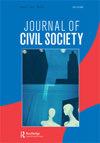Cross-partisanship and the vulnerability democracy: how civility and nonpartisanship undermined civil society in interwar Germany
IF 0.9
Q3 POLITICAL SCIENCE
引用次数: 0
Abstract
ABSTRACT Exclusionary nationalist movements’ rise in recent years challenges liberal democracy’s trust in political institutions’ ability to neutralize and incorporate extremism. The crisis of liberal democracy likewise questions liberal civil society's emphasis on associational membership’s intrinsic democratic side-effects. The study proposes a partisanship spectrum integrating attitudes to conflict into civil society theory, suggesting the centrality of cross-partisanship in mediating modern society’s unavoidable conflicts, a question central to civil society theory and modern democracies. Germany’s first school of public affairs serves as a historical case study to better understand how cross-partisanship addressed the extreme political polarization, radicalization of public discourse, and violence challenging interwar Germany’s transition to democracy. While honouring political factionalism, cross-partisanship (Überparteilichkeit) countered extremism through a correct understanding of political facts and a common commitment to republican institutions. Relying on archival sources, I show that when cross-partisanship was equated to nonpartisanship, it favoured the penetration of extremism by emphasizing compromise and equal representation of all political parties, including the Nazi Party. The question of how to build a civil society is as crucial today as it was in interwar Germany.跨党派和脆弱的民主:文明和无党派如何在两次世界大战之间的德国破坏公民社会
排外的民族主义运动近年来的兴起挑战了自由民主对政治机构消除和吸收极端主义能力的信任。自由民主的危机同样质疑自由公民社会对协会成员的内在民主副作用的强调。该研究提出了一个将对冲突的态度整合到公民社会理论中的党派谱系,表明跨党派在调解现代社会不可避免的冲突中的中心地位,这是公民社会理论和现代民主的核心问题。德国第一所公共事务学院作为一个历史案例研究,可以更好地理解跨党派合作如何解决极端的政治两极分化、公共话语的激进化以及两次世界大战之间德国向民主过渡过程中所面临的暴力挑战。在尊重政治派系主义的同时,跨党派合作(Überparteilichkeit)通过对政治事实的正确理解和对共和制度的共同承诺来对抗极端主义。根据档案资料,我表明,当跨党派等同于无党派时,它通过强调所有政党(包括纳粹党)的妥协和平等代表权,有利于极端主义的渗透。如何建立一个公民社会的问题,在今天和在两次世界大战之间的德国一样至关重要。
本文章由计算机程序翻译,如有差异,请以英文原文为准。
求助全文
约1分钟内获得全文
求助全文

 求助内容:
求助内容: 应助结果提醒方式:
应助结果提醒方式:


